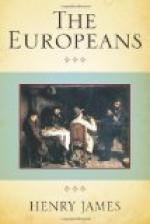her to Europe for the benefit of the tour, gave, on
her return, so lamentable an account of Mr. Adolphus
Young, to whom the headstrong girl had united her
destiny, that it operated as a chill upon family feeling—especially
in the case of the half-brothers. Catherine had
done nothing subsequently to propitiate her family;
she had not even written to them in a way that indicated
a lucid appreciation of their suspended sympathy;
so that it had become a tradition in Boston circles
that the highest charity, as regards this young lady,
was to think it well to forget her, and to abstain
from conjecture as to the extent to which her aberrations
were reproduced in her descendants. Over these
young people—a vague report of their existence
had come to his ears—Mr. Wentworth had
not, in the course of years, allowed his imagination
to hover. It had plenty of occupation nearer
home, and though he had many cares upon his conscience
the idea that he had been an unnatural uncle was,
very properly, never among the number. Now that
his nephew and niece had come before him, he perceived
that they were the fruit of influences and circumstances
very different from those under which his own familiar
progeny had reached a vaguely-qualified maturity.
He felt no provocation to say that these influences
had been exerted for evil; but he was sometimes afraid
that he should not be able to like his distinguished,
delicate, lady-like niece. He was paralyzed and
bewildered by her foreignness. She spoke, somehow,
a different language. There was something strange
in her words. He had a feeling that another man,
in his place, would accommodate himself to her tone;
would ask her questions and joke with her, reply to
those pleasantries of her own which sometimes seemed
startling as addressed to an uncle. But Mr. Wentworth
could not do these things. He could not even bring
himself to attempt to measure her position in the
world. She was the wife of a foreign nobleman
who desired to repudiate her. This had a singular
sound, but the old man felt himself destitute of the
materials for a judgment. It seemed to him that
he ought to find them in his own experience, as a
man of the world and an almost public character; but
they were not there, and he was ashamed to confess
to himself—much more to reveal to Eugenia
by interrogations possibly too innocent—the
unfurnished condition of this repository.
It appeared to him that he could get much nearer, as he would have said, to his nephew; though he was not sure that Felix was altogether safe. He was so bright and handsome and talkative that it was impossible not to think well of him; and yet it seemed as if there were something almost impudent, almost vicious—or as if there ought to be—in a young man being at once so joyous and so positive. It was to be observed that while Felix was not at all a serious young man there was somehow more of him—he had more weight and volume and resonance—than a number of young men who were distinctly serious.




